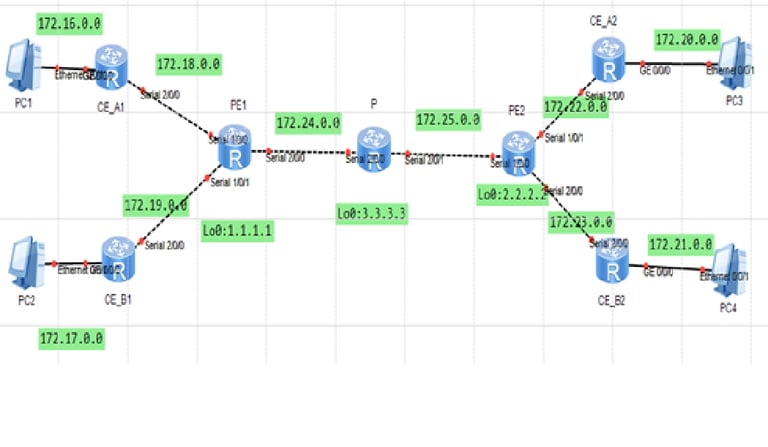Huawei MPLS Layer3 VPN LAB
3/11/2025
In this Post , I am giving example of a complete MPLS Layer 3 Lab configuration using ENSP
Diagram:
Task 1: Connectivity and IP address assignment
First of All , Connect the network as explained above and assign the ip addresses in the depicted networks.
Task 2: BGP Configuration in CE_A1, CE_A2, CE_B1 & CE_B2
Configure Customer routers in BGP, by Putting CE-A1, CE-A2, CE-B1 & CE-B2 in AS 100,200,300,400 respectively. Then in another task put the core into AS 500.
!CE-A1
bgp 100
peer 172.18.0.2 as-number 500
ipv4-family unicast
network 172.16.0.0 255.255.0.0
peer 172.18.0.2 enable
!CE-B1
bgp 200
peer 172.19.0.2 as-number 500
ipv4-family unicast
network 172.17.0.0 255.255.0.0
peer 172.19.0.2 enable
!CE-A2
bgp 300
peer 172.22.0.1 as-number 500
ipv4-family unicast
network 172.20.0.0 255.255.0.0
peer 172.22.0.1 enable
!CE-B2
bgp 400
peer 172.23.0.1 as-number 500
ipv4-family unicast
network 172.21.0.0 255.255.0.0
peer 172.23.0.1 enable
Task 3: Configure OSPF as IGP in the ISP Core
Configure OSPF on the backbone network, and don’t forget to configure the loopback interfaces as their router-id
!PE1
Router id 1.1.1.1
Ospf 1
Area 0
Network 1.1.1.1 0.0.0.0
Network 172.24.0.0 0.0.255.255
!PE2
Router id 2.2.2.2
Ospf 1
Area 0
Network 2.2.2.2 0.0.0.0
Network 172.25.0.0 0.0.255.255
!P
Router id 3.3.3.3
Ospf 1
Area 0
Network 3.3.3.3 0.0.0.0
Network 172.25.0.0 0.0.255.255
Network 172.24.0.0 0.0.255.255
!Verification:
!P
Display ospf peer brief
OSPF Process 1 with Router ID 3.3.3.3
Peer Statistic Information
----------------------------------------------------------------------------
Area Id Interface Neighbor id State
0.0.0.0 Serial2/0/0 1.1.1.1 Full
0.0.0.0 Serial2/0/1 2.2.2.2 Full
---------------------------------------------------------------------------
Task 4:VPN Instances on the PE Side and assign interfaces to the relevant Instances
Configure two VPN instances in each one of the PEs, and assign the relevant interfaces to the equivalent VPN instance, and also don’t forget to configure the RD and route-target.
!PE1
Ip vpn-instance vpn1
Ipv4-family
Route-distinguisher 1:1
Vpn-target 1:1 export-extcommunity
Vpn-target 1:1 import-extcommunity
#
Ip vpn-instance vpn2
Ipv4-family
Route-distinguisher 2:2
Vpn-target 2:2 export-extcommunity
Vpn-target 2:2 import-extcommunity
#
Interface serial 1/0/0
Ip binding vpn-instance vpn1
Ip address 172.18.0.2 16
#
Interface serial 1/0/1
Ip binding vpn-instance vpn2
Ip address 172.19.0.2 16
#
!PE2
Ip vpn-instance vpn1
Ipv4-family
Route-distinguisher 1:1
Vpn-target 1:1 export-extcommunity
Vpn-target 1:1 import-extcommunity
#
Ip vpn-instance vpn2
Ipv4-family
Route-distinguisher 2:2
Vpn-target 2:2 export-extcommunity
Vpn-target 2:2 import-extcommunity
#
Interface serial 1/0/1
Ip binding vpn-instance vpn1
Ip address 172.22.0.1 16
#
Interface serial 2/0/0
Ip binding vpn-instance vpn2
Ip address 172.23.0.1 16
#
Task 5: Configure MP-BGP between PE1 & PE2 and BGP between PEs and CE2
Configure MP-BGP between PE1 & PE2, and configure BGP peer between PE and equivalent CE.
!PE1
Bgp 500
Peer 2.2.2.2 as-number 500
Peer 2.2.2.2 connect-interface lo0
Ipv4-family vpnv4
Peer 2.2.2.2 enable
#
Ipv4-family vpn-instance vpn1
Peer 172.18.0.1 as-number 100
#
Ipv4-family vpn-instance vpn2
Peer 172.19.0.1 as-number 200
#
!PE2
Bgp 500
Peer 1.1.1.1 as-number 500
Peer 1.1.1.1 connect-interface lo0
Ipv4-family vpnv4
Peer 1.1.1.1 enable
#
Ipv4-family vpn-instance vpn1
Peer 172.22.0.2 as-number 300
#
Ipv4-family vpn-instance vpn2
Peer 172.23.0.2 as-number 400
#
Task 6: MPLS Enable on the ISP Core
Enable MPLS in the backbone routers (PE1/PE2/P)
!PE1
Mpls lsr-id 1.1.1.1
Mpls
Mpls ldp
Interface s2/0/0
Mpls
Mpls ldp
!PE2
Mpls lsr-id 2.2.2.2
Mpls
Mpls ldp
Interface s1/0/0
Mpls
Mpls ldp
!P
Mpls lsr-id 3.3.3.3
Mpls
Mpls ldp
Interface s2/0/0
Mpls
Mpls ldp
Interface s2/0/1
Mpls
Mpls ldp
Final Verification:
The ping should work fine and smooth between PCs belonging to the same Customers.
Waleed Hashim Ali Adlan
CCIE#41999/HCIE#14518


Email: network@networkplus-tc.com
Phone: +249913861072/+249119641984/+249100111624
© 2024. All rights reserved.
